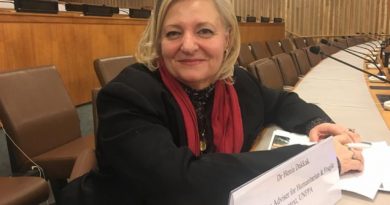Seton Hall Diplomacy Students Attend the Summit of the Future
Rachel Beck
Staff Writer
On September 20 and 21, Seton Hall University was represented at the United Nations Summit of the Future Action Days (UNSFAD), through their status on the Economic and Social Council (ECOSOC). The UNSFAD, which brought together representatives from civil society, the private sector, academia, and Member States, brought forth opportunities for the engagement and inclusion of young people. The different conversations were aimed to make youth engagement and youth voices stronger in the international community. Seton Hall’s representation consisted of two seniors, one junior, three sophomores, and one freshman, in the School of Diplomacy and International Relations, who were extremely grateful for their experience over the two-day period.
Both Action Days began with an opening ceremony, where various speakers stressed the importance of youth leadership and engagement that needs to be seen in the future with the hope of making sure that no one is left behind in the ever-changing world. Emphasis was also placed on promoting peace and security, working with emerging technologies to understand our digital future, and enhancing youth recruitment for international opportunities. The Secretary-General of the United Nations (UN), Antonio Guterres, addressed those at the opening ceremony and spoke on the importance of generational responsibility when it comes to the ever-changing international environment. His Excellency highlighted the need for intergenerational collaboration to become the standard, so that the current generations and future generations have a better, and hopefully more peaceful, future.
One of the special sessions during Friday’s Action Day was on the Governance for Human Rights, Peace and Security, and Political Processes, which was composed of several panel discussions. This session highlighted the idea that young people are the center of sustainable change and need to act. However, there was also an underlining recommendation that state governments, the UN, and other international organizations should meet youth where they stand now. Additionally, it highlighted larger institutions that must encourage and allow for young leaders to rise and be recognized for their ideas and movements. It is a grassroots theory of encouraging the youth in every layer of influence and stage of change.
On Saturday, a session on “A Peaceful Future for All” was attended by the Seton Hall students. A key element of the session was learning how to listen while leading. This is furthered by the idea that if society wants peace, they must be open to listening to various voices spanning across race, gender, and age. During panel on gender equality, Khalida Popal, an Afghan football player, highlighted the importance of women empowerment, especially in international spaces. She pushed for a change in the narrative and to stop filtering the voices of women. Popal showed her attempts at inclusion through driving young girls to get involved in sports like football. By bringing inclusivity to other aspects of life, Popal stressed, we can push back against gender persecution and inequality.
At the same session, a discussion on the protection of civilians was an emotionally tender moment, as Giles Duley, a photographer and founder of The Legacy of War Foundation, showed the audience various images from war-torn cities around the world. His work doesn’t surround the tarnish and destruction of cities or buildings, but the pain and loss that real families face because of war. Duley pressed the audience to understand the true impact of war, not on an international level, but a personal one-at a level of vulnerability. Duley concluded his speech asking for more to be done to help families in crisis and those who don’t have any other way out.
In addition to the two sessions previously mentioned, there were numerous other sessions and side events offered at the UNSFAD. Those sessions focused on different sides to international affairs, including sustainability, global governance, gender equality, and digital influence. Joseph Brennan, a junior at Seton Hall’s School of Diplomacy and International Relations, claimed his favorite part of the summit was a side event on artificial intelligence (AI) and international governance. He explained, “it gave me a lens into the minds of international policymakers and how the constant development of AI makes it extremely difficult to create up-to-date and accurate regulations and standards.”
The UNSFAD focused on the partnership and action of various stakeholders in the international community, hoping to prepare the youth to take action in the next chapter to promote intergenerational inclusivity and understanding. The summit that focused on technological development, international peace and security, and global governance, was a highly anticipated event by both Seton Hall students, and others in attendance. The students would like to thank Seton Hall’s School of Diplomacy and International Relations for the opportunity to attend the summit.

